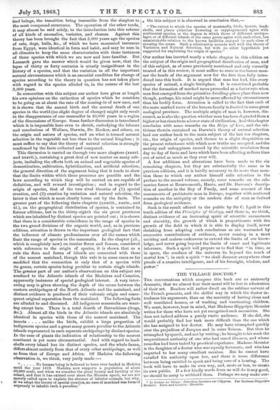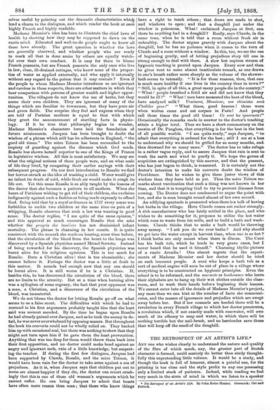THE VILLAGE DOCTOR.•
TuE conversations which compose this book are so eminently dramatic, that we almost fear their moral will be lost in admiration of their art. Readers will rather dwell on the sublime naivete of the French peasants, and the skilful way in which the doctor in- troduces his arguments, than on the necessity of having clean and well ventilated houses, or of washing and vaccinating children. We must, however, bear in mind, that Madame Hippolyte Meunier writes for those who have not yet recognized such necessities. She does not indeed address a purely rustic audience. If she did, she would probably find her task more difficult than the one which she has assigned to her doctor. He may have triumphed quickly over the prejudices of Jacques and la mere Toinon. But then he triumphed byspeech, and not by writing; he brought to his work the unquestioned authority of one who had cured illnesses, and whose remedies had been tested by practical experience. Madame Meunier is the daughter of a doctor who was equally fortunate, and who has imparted to her many excellent maxims. But he cannot have entailed his authority upon her, and there is some difference between being entitled to speak and being sure of a hearing. The book will have to make its own way, and, more or less, to create its own public. If a few kindly words from us will do it any good, we should be sorry to withhold them. Perhaps we may make our- • Le Dakar au Village: Darellau familiers cur rilygiene. Par Madame Iiippolyte Meunier. Paris and London: Machette.
selves useful by pointing out the dramatic characteristics which lend a charm to the dialogues, and which render the book at once highly French and highly readable.
Madame Meunier's idea has been to illustrate the chief laws of health by showing how they may be supposed to dawn on the rustic mind. Educated and well-to-do people ought to know all these laws already. The great question is whether the laws are generally observed, and whether people who are ready to mark all that is done amiss by others are equally watch- ful over their own conduct. It is easy for them to blame French peasants, but are French peasants the only ones who live in low, close, ill-drained cottages, who know none of the proper- ties of water as applied externally, and who apply it internally without any regard to the poison that it may contain ? Even if the people to whom Madame Meunier introduces us are ignorant and careless in these respects, there are other matters in which they bear comparison with persons of greater wealth and higher oppor- tunities. The villagers do not know the use of baths, but they nurse their own children. They are ignorant of many of the things which are familiar to townsmen, but they have pure air and green fields. The surprise they feel and express when they are told of Parisian mothers is equal to that with which they greet the announcement of startling facts in physio- logy. If it be true that philosophy begins in wonder, Madame Meunier's characters have laid the foundation of future attainments. Jacques has been brought to doubt the wisdom of a phrase which still has its adherents in England, "the good old times." The mere Toinon has been reconciled to the impiety of guarding against the diseases which God sends. Rosalie has shown herself superior to one of the Kings of France in legislative wisdom. All this is most satisfactory. We may see what the original notions of these people were, and on what scale of life they lived, by comparing their earlier sayings with their subsequent progress. On our first introduction to Rosalie we find her horror-struck at the idea of washing a child. Water would give an infant its death of cold, while fresh air would make it cough its life out. Yet this same Rosalie is so ably taught by the lessons of the doctor that she becomes a pattern to all mothers. When she hears of Parisians wishing to get rid of their children, she exclaims indignantly against such a fashion as being made expressly to offend God. Being told that by a royal ordinance in 1727 every nurse was forbidden to suckle two children at the same time on pain of a whipping, Rosalie observes that such a law was wanting in good sense. The doctor replies, " I am quite of the same opinion," and this approval so much encourages Rosalie that she asks whether the progris des lumares has not diminished infant mortality. The phrase is charming in her mouth. It is quite consistent with the remark she made on hearing, some time before, that the circulation of the blood from the heart to the lungs was discovered by a Spanish physician named Micael Serveto. Instead of being rewarded for his discovery, the Spanish physician was burnt alive for his religious opinions. This is too much for Rosalie. Burn a Christian alive ! that is too abominable ; she cannot believe it. Perhaps the doctor was a little at fault in this matter. It sounds bad enough now that any one should be burnt alive. It is still worse if he is a Christian. If, besides this, he has discovered the circulation of the blood, there are no limits to the atrocity. But at a time when burning alive was a syllogism of some cogency, the fact that your opponent was a man, a Christian, and a discoverer of the circulation of the blood, was immaterial.
We do not blame the doctor for letting Rosalie go off on what seems to us a false scent. The difficulties with which he had to contend in his first arguments probably taught him that the least said was soonest mended. By the time he began upon Rosalie he had already gained over Jacques, and as he took the enemy in de- tail, he was never overwhelmed by opposing masses. But throughout the book his converts could not be wholly relied on. They backed him up with occasional zeal, but there was nothing to show that they might not turn upon him if he gave them the least provocation. Anything that was too deep for them would throw them back into their first opposition, and no doctor could make bead against an angry and ignorant mob, vain of a little knowledge, but suspect- ing the teacher. If during the first few dialogues, Jacques had been supported by Claude, Rosalie, and the mere Toinon, it would have been vain for the doctor to take arms against a sea of prejudices. As it is, when Jacques says that children put out to nurse are almost happier if they die, the doctor can retort crush- ingly that this is one of those old woman's arguments which he cannot suffer. He can bring Jacques to admit that beasts have often more reason than man ; that those who know things
have a right to teach others ; that doors are made to shut, and windows to open ; and that a dunghill just under the window is poisonous. What ! exclaimed Jacques at first, can there be anything bad in a dunghill? Really, says Claude, in the. same tone, when he is told that a room without fresh air is unhealthy. The doctor argues gravely with Jacques about the dunghill, but he has no patience when it comes to the turn of Claude and a room without a window. In this, too, we see the use of beginning gently, and of letting prejudices sleep till one is. strong enough to deal with them. A slow but copious stream of hygienic teaching is poured upon Jacques. Every now and then. he gives vent to some almost inarticulate remark, as one draws. in one's breath rather more sharply as the volume of the shower- bath seems to intensify. " It is for these reasons, then, that one is much more healthy if one lives in the country than in town?" " Still, in spite of all this, a great many people die in the country. " "What ! people breathed a fetid air and did not know that they would be ill ?" " What ! men have measured the heat of the blood, have analyzed milk? Vraiment, Monsieur, vos chimistes sonic d'habiles gens 1" " What times, good heaven ! those were. when wolves came and eat corpses in Paris ! And people call those times the good old times ! Ce sent les ignorant., II' Occasionally the remarks made in answer to the doctor's teaching, attain a higher level. Thus we have a short commentary on the maxim of Dr. Pangloss, that everything is for the best in the best. of all possible worlds. " I am quite ready," says Jacques, " to. admit that everything is ordered for the best ; still I am at a loss to understand why we should be grilled for so many months, and.. then drowned for so many more." The doctor has to take refuge- in a rather vague reply, and to assure Jacques that rain is sent to. wash the earth and wind to purify it. We hope the germs of scepticism are extinguished by this answer, and that the peasant, who has just begun to think, is reassured. It is certainly not the- doctor's intention to make his converts doubt the wisdom of Providence. But he wishes to give them jester views of this wisdom than they have held as yet. Thus the mere Toinon re- marks about vaccination that such a thing was not known in her time, and that it is tempting God to try to prevent illnesses from coming. The Doctor does not condescend to argue the point with. her, and she is soon brought round almost of her own accord.
An edifying spectacle is presented when there is a talk of having hot baths in the village. Here Claude comes out rather strongly.. A rich manufacturer who has lately settled in the place, and who. wishes to do something for it, proposes to utilize the hot water which runs to waste from his mills, and to build a bath and wash- house. Claude thinks that to make a bath would be throwing away money. " I ask you do we ever bathe ? And why should we get into the water except in harvest time, when one is so hot ?' I think baths are only meant when there is illness. The Cure- has his bath tub, which he lends in very grave cases, but I never heard that he used it himself." Charming idyllic picture of a rustic Arcadia ! One almost regrets that the experi- ments of Madame Meunier and her doctor should be tried. on such innocent people. A curd who keeps a bath tub as a sort of medical engine will soon be out of place in a village where• everything is to be constructed on hygienic principles. Even the school is to be reformed, and the marmots or bonhommes who learn their alphabets are to hang up their wet clothes outside the class- room, and to wash their hands before beginning their lessons.. We cannot enter into all the details of Madame Meunier's project,. any more than we can hint at the number of facts she communi- cates, and the masses of ignorance and prejudice which are swept away before her. But if her counsels are heeded there will be e revolution in every French village to which her doctor penetrates,. a revolution which, if not exactly made with rosewater, will owe- much of its efficacy to soap and water, in which there will be nothing terrible but the nail-brush, and no barricades save those that will keep off the smell of the dunghill.































 Previous page
Previous page